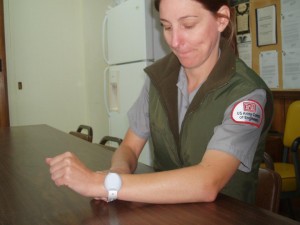Pilot Club looks to resuscitate Project Lifesaver
As president of the Demopolis Pilot Club she is working to reinvigorate Project Lifesaver.
The program, initiated in Marengo County by the club several years ago, provides timely response to save lives and reduce potential injury for adults and children who have the potential to wander because of brain-related problems.
When the Pilot Club first began Project Lifesaver, it drew on the generosity of businesses and individuals to purchase the equipment and on the Marengo County Sheriff’s Department to be its partner in the program.
The club bought 17 tracking bracelets at $250 each, two portable locators, which cost about $3,800 each, and the training that goes along with the program. At one time 14 residents of the county wore the bracelets. Three are in use today.
In recent years the project has languished because of turnovers in both the club and the Sheriff’s department. Now Cross wants to remind caregivers that they have a way to provide peace of mind in case their loved one wanders away.
Provided at no cost to the client, the bracelet can be worn on the wrist or ankle. A transmitter in the bracelet has a unique signal assigned to the user. If at any time the client goes missing, a call to 911 is all that is needed to activate a search. The Sheriff’s Department uses the tracking locators to hone in on the signal, which can be picked up within a five-mile radius, either on the ground or in the air.
Cross, who works for the U.S. Army Corps of Engineers, came back to Demopolis and joined the Pilot Club a year ago. She had been a member of the Guntersville Pilot Club for four years and was impressed with Project Lifesaver the club had initiated.
Her passion for Project Lifesaver comes from her own experience. Her grandfather, who suffered from dementia, wandered away from home, and family and friends spent several frantic hours searching for him. She believes that if Project Lifesaver had been in place, he could have been located within minutes instead of hours.
In order for a patient to become part of Project Lifesaver, the caregiver needs to contact either the Sheriff or a member of the Pilot Club and fill out a two-page application. Clients must live in Marengo County and be diagnosed with an illness that makes them non-verbal and have a tendency to walk away from home.
Such conditions may include Alzheimer’s, other forms of dementia, Down’s Syndrome or autism. Each month a deputy sheriff will visit the client to replace the battery in the transmitter.
One of the concerns of many families is that the transmitter is monitored constantly. That is not the case, said Cross. It is not activated unless a 911 call comes into the Sheriff’s Department.
Fortunately there hasn’t been a case in Marengo County where the tracking devices have been called into use, but Project Lifesaver is a nation-wide program. The latest use was April 20 in Hickory, N.C. An Alzheimer’s patient was found within 16 minutes of the call.
Cross said use of Project Lifesaver not only cuts the time in locating a client, but it cuts the costs of search and rescue and improves the chances of survival.
Cross rolls off as president of the Pilot Club at the end of June. Her involvement in Project Lifesaver won’t be ending, however. She has volunteered to spearhead the project and get the word out to families across the county who might be in need of its services.

